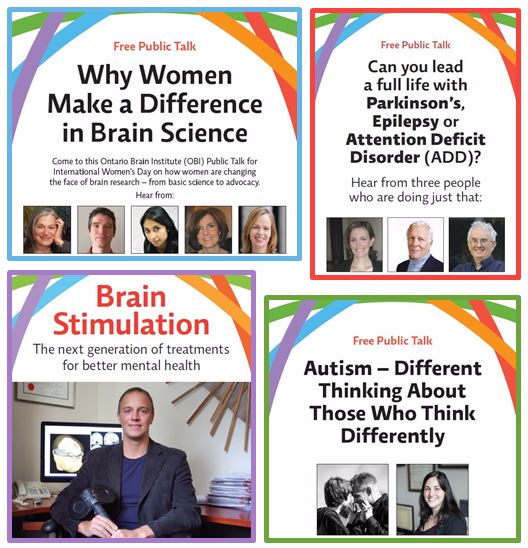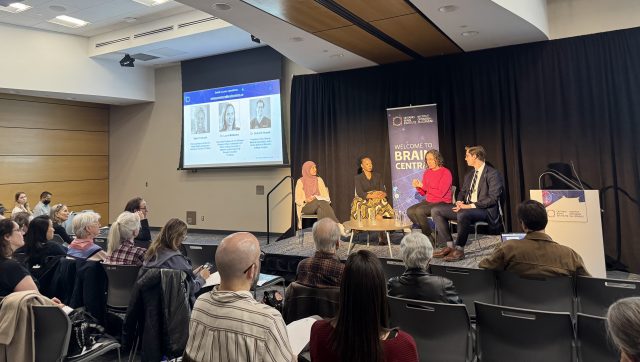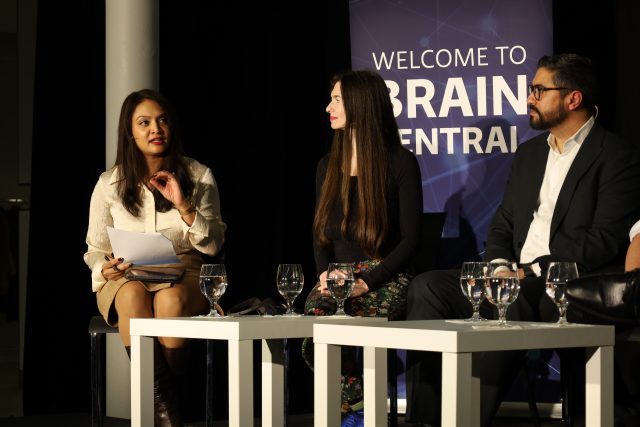By: Lucia Kwan, Research Programs Intern, Ontario Brain Institute
Do you know someone living with autism, dementia, or depression? Chances are you do. In fact, we know that one in three Canadians have or will develop a brain disorder in their lifetime. In Ontario alone, there are at least 135,000 individuals living with dementia as of 2010, which is approximately the population of Whitby!
In Ontario, we are in a unique position to tackle the large and growing issue of brain disorders: we have over 800 neuroscience researchers, 130 brain-related companies, and 100 institutions involved in neuroscience. Since 2010, the Ontario Brain Institute (OBI) has been working to create networks of researchers, clinicians, industry, and patients and their advocates for depression, neurodegenerative disorders, epilepsy, cerebral palsy, and neurodevelopmental disorders. These networks ensure that the knowledge emerging from these experts gets relayed back to the individuals and families who need it most. At OBI, knowledge translation is one of the key steps in bridging the gap between “what we know” and “what we do”. We are always looking for ways to move lab experiments, clinical trials, and treatments beyond academic forums, and one way is to speak directly to the public and engage them in the exciting advances that are happening in neuroscience and brain health.
At our public talks, we aim to move beyond science communication to achieve three goals. First, we are focused on increasing public access to information about brain research and technological advances for diagnosis and treatment. Second, we are creating opportunities for researchers to share and discuss their latest findings with the public, and have the public share their thoughts, concerns, and personal experiences. Finally, we are working towards establishing a stronger network between the public and people that are involved in neuroscience. Together, these goals have the potential to drive better care for patients and their advocates, including families and caregivers.
Over the last two years, OBI has hosted ten public talks, drawing an audience of 500+ to the majority of them. Our talks cover a range of topics, including research, commercialization, and patient engagement, which feature researchers, clinicians, entrepreneurs, and patients and their advocates. A few highlights:
At one of our recent talks, co-hosted with the Ontario Institute for Regenerative Medicine, two of our leading experts in cerebral palsy, Dr. Cindi Morshead and Dr. Michael Fehlings, tackled the hope and the hype surrounding stem cell research. This talk provided an opportunity to discuss the potential, but also realistic views and expectations, of novel research with the public.
In March, OBI celebrated International Women’s Day by highlighting why woman make a difference in brain science. At this talk, Drs. Gillian Einstein, Jason Lerch (one of our neurodevelopmental disorder researchers), and Pooja Viswanathan (2015 OBI Entrepreneur) discussed how sex differences in the brain can largely affect research and technology development; Judith John , a communications professional and brain tumor survivor, shared her experience of how sex can play a role in patient care, especially in the early stages of diagnosis; and Marcia Moffat, Country Head of BlackRock Asset Management in Canada and Vice-Chair of OBI’s Board of Directors, drew attention to the obstacles that women face in their careers, which is especially important given the increasing number of women leaving the science, technology, engineering, and mathematics fields.
In September, OBI held its first public talk in Mississauga. Dr. Guy Seabrook updated the audience on the latest discoveries about memory, where Alzheimer’s research stands and where it is headed. CBC’s Senior Correspondent, Susan Ormiston, highlighted the importance of research in this area by sharing her personal experience covering Alzheimer’s as a journalist and dealing with it in her family.
Finally, last year, we invited experts in lived experience Andy Barrie (Parkinson’s), Rick Green (attention deficit disorder), and Whitney Goulstone (epilepsy) to openly discuss life with a brain disorder and their everyday successes and challenges. Although each of their experiences was unique, a common theme emerged from all three talks: a call to action to continue to advocate for brain research. For example, a recent retrospective study led by Dr. Jorge Burneo, an EpLink researcher, found that of the 10,661 Ontarians diagnosed with drug-resistant epilepsy in 2001-2010, 12% died within two years of diagnosis, yet only 1.2% underwent surgery. Whitney underwent successful surgery for this type of epilepsy in 2010, and has been dedicated increasing awareness for epilepsy surgery ever since.
How do we know if we have achieved our goals through public talks? One of the most impactful and valuable measures comes from hearing directly from talk attendees. Over 90% of people that attend our public talks report increased knowledge about brain disorders.
“We have been living with a son with epilepsy since 2011 and I found the event on Tuesday to be the most informative session that I have ever attended on the subject. I found the presentations by all three of your guests to be very informative and I came away with far more knowledge…as we start on the next part of our journey I feel that I am more informed and have stronger knowledge base to help ask better questions of the medical professionals.” – parent, following “Three Brains. Three Lives. Three Stories.”
Ultimately, through public talks and, more generally, knowledge translation, OBI aims to increase public access to brain health and increase recognition of Ontario as a world leader in neuroscience. We can only achieve this if researchers, clinicians, industry, and patients and their advocates work together to identify priorities on how to improve patient care. So, we want to hear from you! What do you want to learn more about in brain health at our next public talks? Please submit your feedback and suggestions for previous and future talks to talks@braininstitute.ca.
If you want to learn more about our public talks and future events, please visit our YouTube channel and Events page and subscribe to our news!



